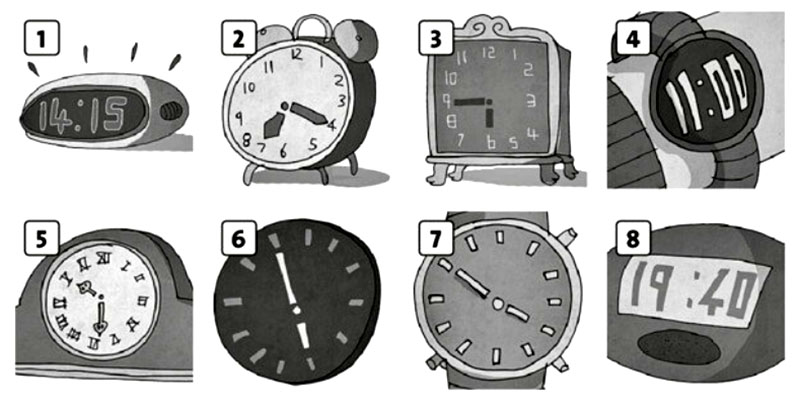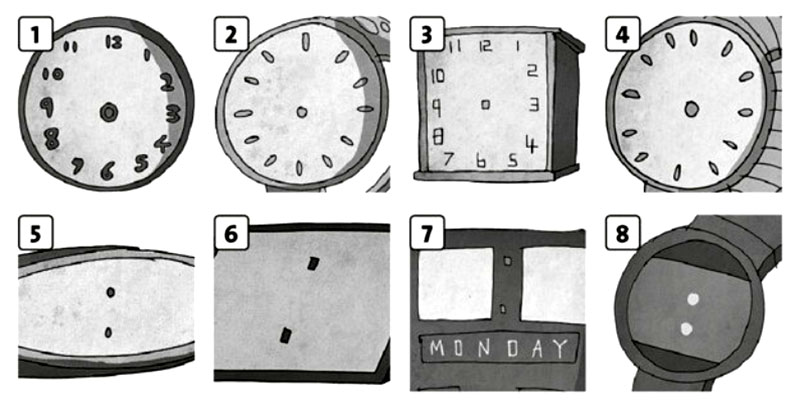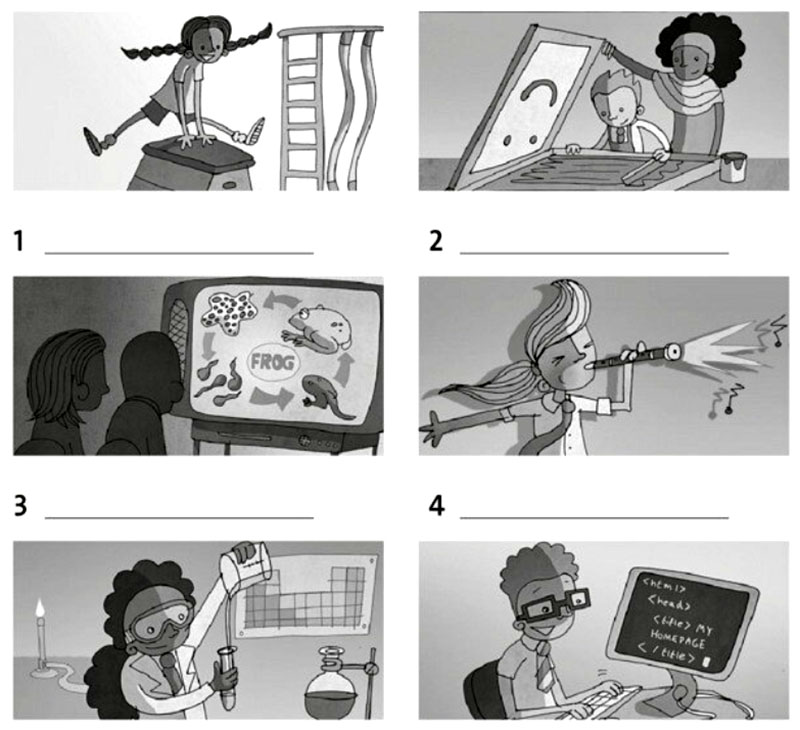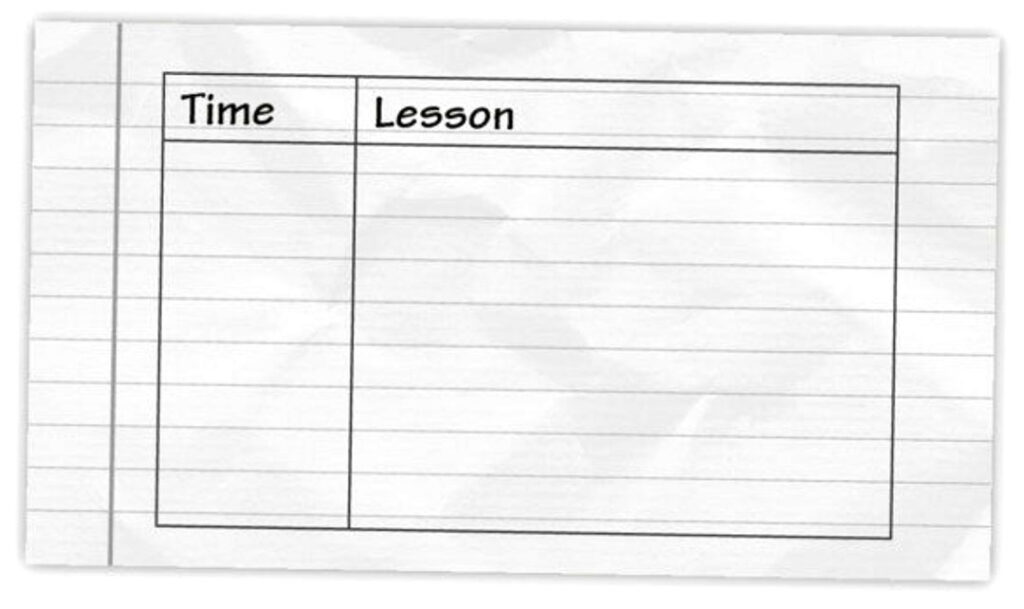1. Complete the phrases with the verbs below.
arrive get go have (x3) leave wake
1 ………………….. up
2 ………………….. dressed
3 ………………….. breakfast
4 ………………….. at school
5 ………………….. lunch
6 ………………….. school
7 ………………….. dinner
8 ………………….. to bed
Answer
1 wake 2 get 3 have 4 arrive 5 have 6 leave 7 have 8 go
2. Look at the pictures and label the times. Use the phrases in the table.
|
one, two … twelve o’clock |
||
|
five / ten / quarter / twenty / twenty-five |
to / past |
one, two, three, four, … ten, eleven, twelve |
|
half |
past |
|

1 …………………………
2 …………………………
3 …………………………
4 …………………………
5 …………………………
6 …………………………
7 …………………………
8 …………………………
Answer
1 quarter past two 2 twenty past seven 3 quarter to six
4 eleven o’clock 5 half past ten 6 five to five
7 ten to four 8 twenty to eight
3. Listen and draw the times on the clocks.

Answer
1 6.45 2 4.00 3 11.10 4 7.55 5 1.30 6 3.25 7 5.15 8 11.40
Transcript
1 It’s quarter to seven.
2 It’s four o’clock.
3 It’s ten past eleven.
4 It’s five to eight.
5 It’s half past one.
6 It’s twenty-five past three.
7 It’s quarter past five.
8 It’s twenty to twelve.
4. Choose five verbs from exercise 1. Write sentences saying what time you do these activities on a normal school day.
1 I wake up at half past seven.
2 …………………………………………….
3 …………………………………………….
4 …………………………………………….
5 …………………………………………….
6 …………………………………………….
Answer
your own answers
5. Label the lessons with six of the school subjects below.
art and design biology chemistry economics English
French geography German history I.C.T maths music
P.E. physics R.E.

Answer
1 P.E. 2 art and design 3 biology 4 music 5 chemistry 6 I.C.T.
6. Listen. What lesson is it? Choose four other subjects from exercise 5.
1 …………………………
2 …………………………
3 …………………………
4 …………………………
Answer
1 history 2 maths 3 R.E. 4 English
Transcript
1
Teacher Come in, sit down. Open your books – page 56.
Tyler What’s the topic today?
Girl I don’t know. Let’s see …
Te Today’s topic is World War I. What are the dates of World War 1? Anyone?
Ty Ooh ooh … 1939 to 1945.
Te No, that’s World War 2.
2
Teacher Now, write this in your notebooks: x plus thirty-six equals y plus seven.
Tyler x plus thirty-six equals y plus seven.
Te And now write this …
Ty This is really difficult! When’s break time?
Girl At ten o’clock.
3
Tyler Oh, no, I haven’t got my books.
Teacher Don’t worry. Today, we’ve got a video.
Ty Oh, good.
Te It’s about the festival of Diwali. Which religion is Diwali part of? … Come on! Is it Christianity? Hinduism? Buddhism?
4
Teacher So, what happens at the end of Shakespeare’s Romeo and Juliet? Tyler?
Tyler I’m not sure. Do they get married?
Te Er … well, yes. They get married. But that isn’t the end of the play. What happens at the end? Do they live happily ever after?
Ty Yes.
Te Really?
Ty I mean, no. Er … they die.
Te That’s right! They die.
Te OK, that’s lunch.
7. Write your school timetable for Monday. Include the times for each lesson and your breaks.

Answer
your own answers
8. Answer the questions about your timetable in exercise 7.
1 Do you have English on Monday? …………………………
2 What time is your first lesson? …………………………
3 What time is your last lesson? …………………………
4 How many breaks do you have? …………………………
5 Do you enjoy this day? Why? / Why not? …………………………
Answer
your own answers
Extra exercises
1. Complete the daily routine phrases in the text. Write one word.
I 1…………………… up at 7.20 a.m. during the week, and I get up at 7.30. First, I have a shower and then 2…………………… dressed. Next, I 3…………………… breakfast. I usually walk to school. I 4…………………… at school at 8.30 a.m. In the afternoon, I 5…………………… school at 2.30 p.m. After that, I do my homework and see friends. I 6…………………… to bed early because I have to go to school the next day.
Answer
1 wake 2 get 3 have 4 arrive 5 leave 6 go
2. Complete the definitions with school subject.
1 …………………… is the study of numbers, measurements and shapes.
2 …………………… is the study of the way people and countries spend money and make, buy and sell things.
3 …………………… is the study of things that happened in the past.
4 …………………… is the study of the Earth and everything on it, such as mountains, rivers, land and people.
5 …………………… is the study of the life of animals and plants.
Answer
1 Maths 2 Economics 3 History 4 Geography 5 Biology
3. Complete the second sentence using the opposite of the adjectives in the first sentence.
1 China is a large country.
Andorra ………………………
2 During the day, New Orleans is safe.
At night, ………………………
3 This road is very wide.
That path ………………………
4 Summer is Portugal is usually dry.
Winter in Portugal ………………………
Answer
1 is a small country
2 New Orleans is dangerous
3 is very narrow
4 is usually wet
4. Complete the sentences with the words below.
boat bridge jungle mountain river valley
1 The Golden Gate ……………………… is in San Francisco.
2 The ……………………… Thames is in London.
3 Kilimanjaro is a ……………………… in Tanzania.
4 The river in the bottom of this ……………………… is called the Rhine.
5 The Amazon rainforest is a large ……………………… in South America.
6 The only way to visit the Statue of Liberty in New York is by ………………………
Answer
1 bridge 2 River 3 mountain 4 valley 5 jungle 6 boat
5. Choose the correct answers.
1 Emma is …………. She wants to go to bed.
a angry
b sad
c tired
2 Max is …………. He can’t find his phone.
a happy
b embarrassed
c worried
3 We’re …………. Our holiday starts tomorrow.
a excited
b worried
c angry
4 I’m …………. I can’t remember your name.
a tired
b embarrassed
c happy
5 The teacher is …………. All the students are late.
a angry
b excited
c happy
6 Charlotte’s …………. She doesn’t like her new school.
a excited
b sad
c tired
Answer
1 c 2 c 3 a 4 b 5 a 6 b
Related Posts
- English Vocabulary Exercises for A1 – My home
- English Vocabulary Exercises for A1 – Sports and hobbies
- English Vocabulary Exercises for A1 – Computing
- English Vocabulary Exercises for A1 – Wild animals
- English Vocabulary Exercises for A1 – Places
- English Vocabulary Exercises for A1 – Are you hungry?
